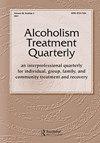Recommending Collegiate Recovery Programs to Institutes of Higher Education in Ireland
IF 0.9
Q4 SUBSTANCE ABUSE
引用次数: 0
Abstract
ABSTRACTIn 2022, a national study titled The DUHEI (Drug Use in Higher Educationin Ireland) was conducted to determine the prevalence and problem of drug use among students in institutes of higher education. The findings of the DUHEI revealed that drug use is prevalent among college students in Ireland, with over half reporting they use or hadused drugs in the past.The study also uncovered a subpopulation of students who have recovered from a previous problem with drug or alcohol use in thepast, known as students in recovery. These students were identifiedas a unique and vulnerable population in need of specific support on college campuses. The authors of the report recommend the establishment of collegiate recovery programs in institutes of higher education in Ireland to support these students in active recovery from addiction. Collegiate recovery programs are well established in the U.S and are emerging in the UK and Canada. This perspective article echoes, and extends upon the DUHEI recommendationto implement CRPs in Ireland, by highlighting the evidence base which demonstrates the efficacy of collegiate recovery programs. Itis important that Irish colleges and Universities follow international best practice by establishing collegiate recovery program.KEYWORDS: Collegiate Recovery ProgramsAddiction RecoveryHigher EducationStudent servicesSubstance Misuse Disclosure statementNo potential conflict of interest was reported by the author(s).向爱尔兰高等教育机构推荐大学康复计划
摘要:2022年,爱尔兰开展了一项名为DUHEI(高等教育中的药物使用)的全国性研究,以确定高等教育机构学生中药物使用的流行程度和问题。DUHEI的调查结果显示,吸毒在爱尔兰大学生中很普遍,超过一半的人报告他们过去正在使用或曾经使用过毒品。该研究还发现了一个学生亚群,他们从过去的吸毒或酗酒问题中恢复过来,被称为康复学生。这些学生被认为是大学校园中需要特殊支持的特殊弱势群体。该报告的作者建议在爱尔兰的高等教育机构建立大学康复计划,以支持这些学生从成瘾中积极康复。大学康复计划在美国已经建立,在英国和加拿大也正在兴起。这篇观点文章呼应并扩展了DUHEI在爱尔兰实施crp的建议,强调了证明大学康复计划有效性的证据基础。重要的是,爱尔兰的学院和大学通过建立大学康复计划来遵循国际最佳实践。关键词:大学康复计划;成瘾康复;高等教育;学生服务;药物滥用披露声明;
本文章由计算机程序翻译,如有差异,请以英文原文为准。
求助全文
约1分钟内获得全文
求助全文
来源期刊

Alcoholism Treatment Quarterly
SUBSTANCE ABUSE-
CiteScore
1.60
自引率
11.10%
发文量
31
期刊介绍:
Alcoholism Treatment Quarterly is an exciting professional journal for clinicians working with persons who are alcoholic and their families. Designed to bridge the gap between research journals and information for the general public, it addresses the specific concerns of professional alcoholism counselors, social workers, psychologists, physicians, clergy, nurses, employee assistance professionals, and others who provide direct services to persons who are alcoholic. The journal features articles specifically related to the treatment of alcoholism, highlighting new and innovative approaches to care, describing clinical problems and solutions, and detailing practical, unique approaches to intervention and therapy.
 求助内容:
求助内容: 应助结果提醒方式:
应助结果提醒方式:


